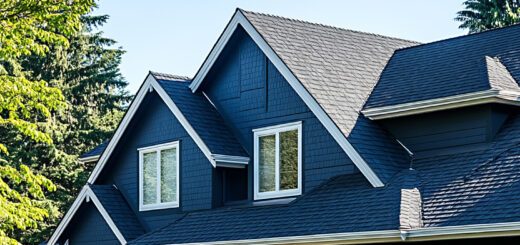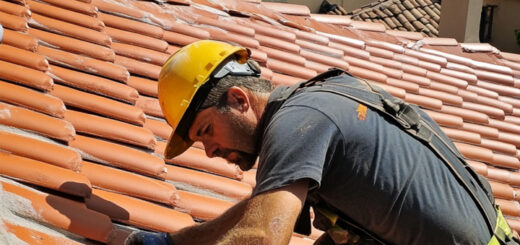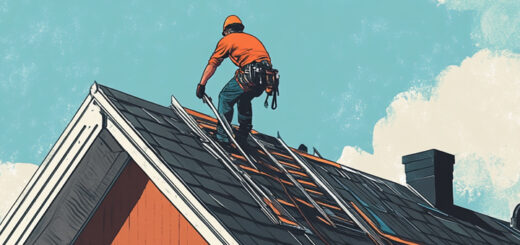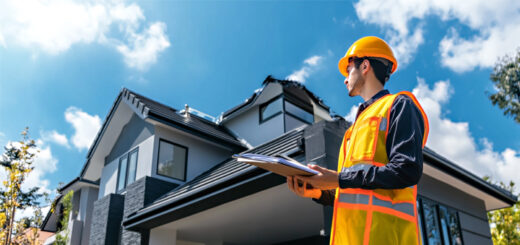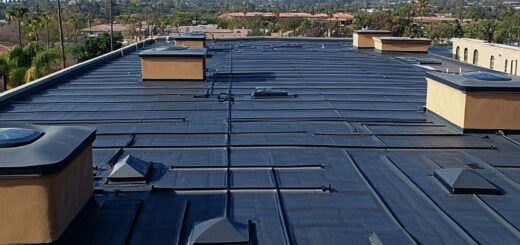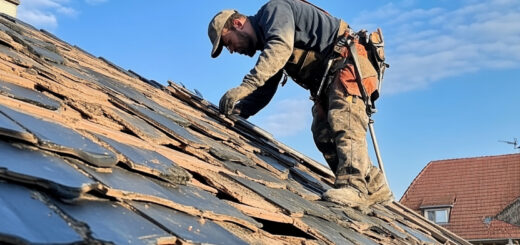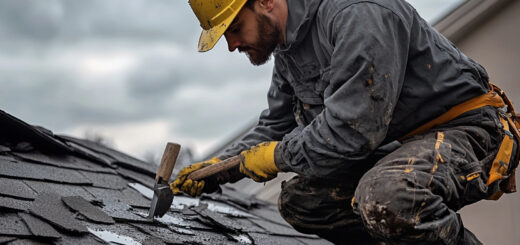Selecting a Professional for Your Commercial Roofing Repairs
When it comes to maintaining the integrity of a commercial building, one of the most critical aspects is the roof. Commercial roofing repairs are not just about fixing leaks or replacing damaged tiles; they play a vital role in ensuring the overall safety and longevity of the structure. Choosing the right professional roofer for these tasks is paramount.
A professional roofer brings specialized knowledge and experience to handle various commercial roof issues efficiently. From understanding different roofing materials to identifying potential problems that may not be visible at first glance, their expertise can prevent minor issues from escalating into major, costly repairs.
The importance of timely roof repair cannot be overstated. Regular building maintenance, including prompt attention to roof-related concerns, helps in maintaining a safe environment for occupants and protecting valuable assets within the building. Moreover, well-maintained roofs contribute to energy efficiency by providing better insulation, which can lead to significant cost savings on utility bills.
In summary, investing in a qualified professional for commercial roofing repairs ensures that your building remains in optimal condition. It safeguards against unforeseen damages and prolongs the lifespan of your roof, ultimately contributing to a more secure and efficient commercial property.
Key Qualities to Look for in a Commercial Roofing Contractor
When selecting a commercial roofing contractor, it’s crucial to consider several key qualities to ensure you’re making the best choice for your business. The following attributes can help you identify a reliable roofing company that meets your needs:
- Experience and Expertise: An experienced roofing contractor brings years of hands-on knowledge and skills to the table. Look for a company with a proven track record in commercial roofing projects, as their expertise will be invaluable in handling complex installations, repairs, and maintenance.
- Licensing: Always verify that the roofer is licensed to operate in your area. A licensed roofer has met local regulatory requirements and adheres to industry standards, providing an added layer of assurance regarding their professionalism and competence.
- Insurance: Ensure that the contractor is fully insured, including both liability insurance and workers’ compensation. An insured roofer protects you from potential liabilities arising from accidents or damages during the project.
- Reputation for Reliability: A reliable roofing company will have positive reviews and testimonials from previous clients. Check online reviews, ask for references, and consult with other businesses who have used their services to gauge their reliability.
By focusing on these key qualities—experience, licensing, insurance coverage, and reliability—you can confidently select a commercial roofing contractor who will deliver high-quality work while safeguarding your investment.
Questions to Ask Before Hiring a Commercial Roofer
When it comes to hiring a commercial roofer, conducting thorough due diligence is crucial to ensuring the longevity and quality of your roofing project. Here are some essential questions you should ask before making your decision:
What is Your Experience with Commercial Roofing?
Understanding the specific experience a roofing contractor has with commercial projects can give you insight into their expertise and reliability. Ask for examples of past projects similar to yours.
Can You Provide References?
Reliable roofing contractors should be able to provide references from previous clients. Contact these references to inquire about their experiences, the quality of work, and any issues they encountered.
Are You Licensed and Insured?
Ensure that the roofer holds all necessary licenses and insurance coverage. This not only protects you from liability but also indicates that the contractor adheres to industry standards.
What Warranties Do You Offer?
Inquire about both workmanship and material warranties. A reputable commercial roofer will offer comprehensive warranties that cover potential issues arising after project completion.
Can You Provide a Detailed Estimate?
Request a written estimate that breaks down costs for labor, materials, permits, and any other expenses. This transparency helps prevent unexpected costs down the line.
How Do You Handle Safety on Job Sites?
Safety is paramount in commercial roofing projects due to their complexity and scale. Ask about safety protocols, training programs for workers, and compliance with OSHA regulations.
By asking these key questions during your inquiry into commercial roofing services, you’ll be better equipped to make an informed decision that ensures quality workmanship and peace of mind throughout your project.
The Benefits of Hiring Local Roofing Experts
When it comes to maintaining or repairing your roof, hiring local roofing experts offers numerous advantages. One of the primary benefits is the local commercial roofer’s familiarity with the area’s specific weather conditions and building codes. This local expertise in roofing repairs ensures that your roof is not only compliant with regulations but also built to withstand local climate challenges.
Community-based contractors bring a personal touch to their work, as they are part of the same community you live in. This often translates into a higher level of commitment and accountability, as their reputation is directly tied to their performance on your project. Additionally, working with local experts means quicker response times and more flexible scheduling, which can be crucial during emergency repairs.
Furthermore, hiring a local roofer supports the community economy by keeping money within the region and fostering job growth. Local contractors also tend to have established relationships with nearby suppliers, which can lead to better pricing on materials and quicker turnaround times for projects.
In summary, choosing a local commercial roofer provides you with tailored expertise, personalized service, and contributes positively to your community. It’s a decision that brings both immediate benefits and long-term peace of mind.
Understanding Different Types of Commercial Roofs and Repair Techniques
When it comes to maintaining the integrity of a commercial building, understanding the different types of commercial roofs and their specific repair techniques is crucial. This knowledge can help property managers make informed decisions about maintenance and repairs, ultimately prolonging the lifespan of their roofing systems.
Commercial Roof Types
- Flat Roofs: Common in many commercial buildings due to their cost-effectiveness and ease of installation. However, flat roofs are prone to water pooling, which can lead to leaks and structural damage if not properly maintained.
- Metal Roofs: Known for their durability and longevity, metal roofs are often used in industrial buildings. They are resistant to many weather conditions but can suffer from rust and corrosion over time.
- Single-Ply Membranes: These are flexible sheets made from synthetic materials like TPO (Thermoplastic Olefin) or EPDM (Ethylene Propylene Diene Monomer). Single-ply membranes are popular for their ease of installation and excellent waterproofing properties.
Repair Techniques
Flat Roof Repair Methods:
- Patching: For minor leaks or small areas of damage, applying a patch with roofing cement or sealant can be an effective temporary solution.
- Re-Coating: Applying an additional layer of coating material helps improve waterproofing capabilities while extending the roof’s life.
- Full Replacement: In cases where damage is extensive, replacing the entire roof might be necessary to ensure long-term protection.
Metal Roof Repair Techniques:
- Rust Removal: Using wire brushes or sandblasting tools to remove rust before applying a rust-inhibitive primer.
- Sealing Leaks: Metal roofs often require specialized sealants that can withstand thermal expansion and contraction.
- Panel Replacement: Damaged panels should be replaced promptly to prevent further issues such as water infiltration or structural weakening.
Single-Ply Membrane Repair:
- Patch Kits: These kits typically include adhesive-backed patches specifically designed for single-ply membranes.
- Heat Welding: For TPO membranes, heat welding is an effective method where seams are fused together using hot air tools.
- Adhesive Repairs: EPDM membranes often use specially formulated adhesives that bond well with the material for patch repairs.
Understanding these various commercial roof types along with appropriate repair methods ensures that property managers can address issues promptly and effectively, safeguarding both their investment and the occupants within the building.
The Cost Factor: Getting the Best Value for Your Investment in Roof Repairs
When it comes to roof repairs, understanding the cost factor is crucial for making informed decisions and ensuring you get the best value for your investment. Roof repair costs can vary significantly based on several factors, including the extent of damage, materials used, and labor charges. By conducting a thorough roof repair costs comparison, you can identify budget-friendly roofing solutions that meet your needs without compromising quality.
One effective approach is to obtain multiple quotes from reputable contractors. This not only helps in comparing prices but also provides insight into different approaches and materials that might be more cost-effective. For instance, some contractors may suggest affordable yet durable alternatives to high-end materials that still offer excellent longevity and performance.
In commercial settings, cost-effective commercial repairs are particularly important as they directly impact operational budgets. Investing in regular maintenance can prevent minor issues from escalating into major problems that require expensive interventions. Additionally, opting for energy-efficient roofing solutions can lead to long-term savings on utility bills.
Ultimately, balancing cost with quality is key to achieving a successful roof repair project. By staying informed and exploring various options, you can ensure that your investment yields lasting benefits while remaining within budget constraints.

